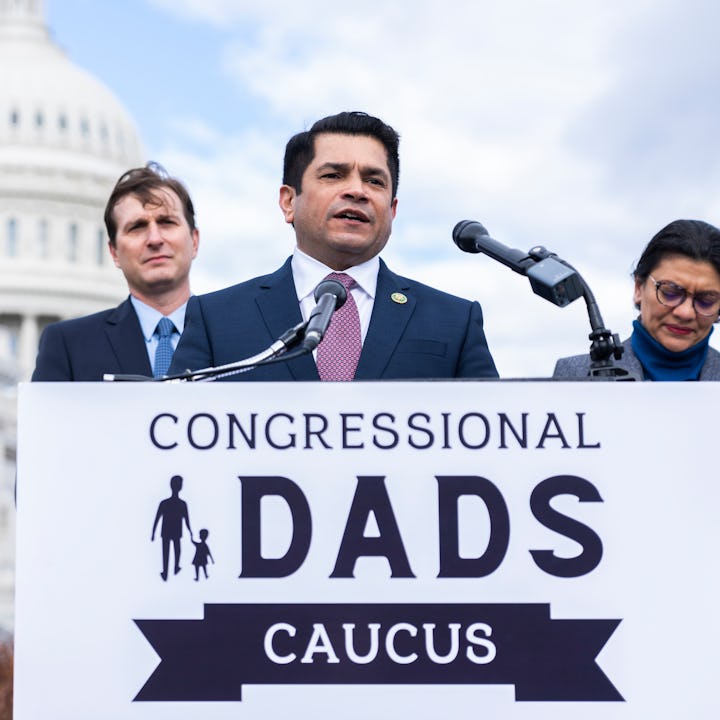Not Everyone Is Applauding The New Dad Caucus
The congressional dad caucus introduced by Rep. Jimmy Gomez is a step in the right direction, but parents still need more inclusive representation.

California Congressman Jimmy Gomez started bringing his four-month-old son Hodge to the congress floor in early January and caught the attention of the country as a working dad. Shortly after, he and other dads in the House of Representatives formed the Dads in Congress Caucus.
“The creation of the Dads Caucus sends a powerful message: We want to show not just interest but advocacy on the issues that impact working parents, and change the hearts and minds when it comes to the role of fathers at home and in Congress,” Gomez said, per The Hill.
The group of fathers wants to advocate for legislation and policies to support families, like the Child Tax Credit and paid parental leave for all. “[W]e’ll develop hearings, and working groups, as well as host educational seminars for staff and for members,” Gomez told Washington Post, noting that the group will also act as a support network for dads in Congress.
The group teamed up with nonprofit organizations and advocacy groups like Paid Leave for All, the National Alliance for Caregiving, and MomsRising to make the caucus a reality.
The formation of the group comes four years after Moms in the House Caucus was established with similar goals in mind for moms in the House of Representatives.
While both caucuses are a win for families looking for better access to child health care and other support systems, the formation of the dad caucus doesn’t go far enough in terms of equitable parental representation and support, according to policy experts.
“Now we’ve reached a point in time where men — well, some men, from the progressive end of one political party — are able to embrace their parental roles, and to feel that they have a perspective that would be really useful for putting forward family-friendly legislation, and that’s a role that has traditionally fallen to women,” Jennifer Lawless, a professor of politics at the University of Virginia, told the Washington Post. “That represents a degree of progress.”
Lawless believes that having a unified caucus comprised of all parents would be more inclusive and help dismantle deeply ingrained gender roles when it comes to parenting.
“Splitting them up this way still, in some ways, highlights that women and men still have very different roles when it comes to taking care of their families and their children,” she explained. “Four years ago, when we said ‘Well, why is it just the mothers’ — I don’t think I was thinking, ‘there should also be a father’s caucus.’ I was thinking men and women should be working together.”
Gomez acknowledged that the caucus will not solve all the hardships and gender inequality of parenting in one fell swoop. “[It] is not going to be easy,” he admitted of the caucus formation, “because some people will believe that we’re getting unfair attention, and other people are going to believe that we’re truly not doing enough — and we’re probably not doing enough! But I think this is going to help start those conversations.”
“We need a parent caucus,” tweeted Reshma Saujani, CEO and founder of Moms First US a few weeks before the formation of the dad caucus. “Imagine if a handful of parents held up Congress the way the Republicans have. (Spoiler: we would have child care and paid leave.)”
The newly formed Dad Caucus in Congress is a step in the right direction. We should absolutely normalize men being equal caregivers in cishet, nuclear families, and dads who happen to be politicians should be actively fighting for ways to enhance the quality of life for so many families barely making ends meet. But Washington still has a ways to go in terms of supporting parents of all genders and families that do not fall under the traditional nuclear unit umbrella.